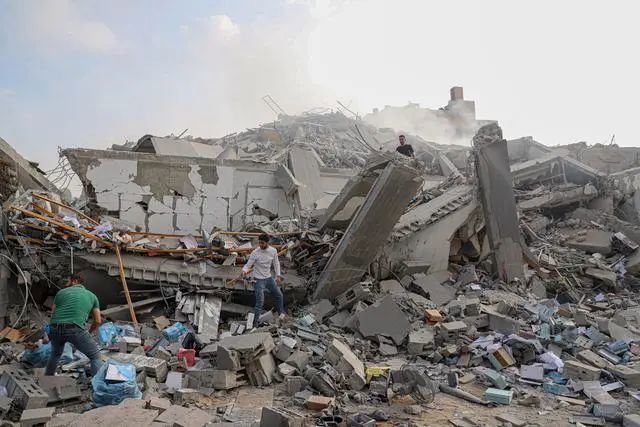
On October 7th, the Palestinian Islamic Resistance Movement (Hamas) announced a military operation codenamed "Al Aqsa Flood" against Israel and fired at least 5000 rockets into Israeli territory. Israeli Prime Minister Netanyahu issued a statement on the same day stating that Israel has entered a state of war and has instructed the mobilization of reserve forces for counterattacks.
At present, military conflicts are still ongoing. The latest data shows that as of now, in the current round of the Israeli-Palestinian conflict, the number of deaths in Israel has exceeded 700, and at least 2156 people have been injured. According to local media reports, the conflict has injured 2243 people in Israel, of which more than 300 are seriously injured.
According to data released by the Palestinian health department, Israeli air strikes on the Gaza Strip have resulted in 413 Palestinian deaths, including 78 children and 41 women. In addition, the airstrikes also injured 2300 people and displaced more than 20000 people in the Gaza Strip.
The conflict between Palestine and Israel will have a profound impact on the global economy, and this impact is an extremely complex process that involves multiple factors and uncertainties. Generally speaking, war increases risk aversion in the market, leading to the preference for safe haven assets such as gold and the US dollar, while risky assets such as stocks and emerging market currencies are sold off. But the specific degree and duration of the impact depend on factors such as the scale, duration, and scope of the conflict.
From the perspective of commodities, their prices are highly susceptible to the influence of supply and demand relationships and geopolitical factors. Especially as an important strategic resource, the conflict between Palestine and Israel, although not directly affecting oil production or transportation, has exacerbated the instability and uncertainty in the Middle East region, thereby pushing up the oil price risk premium; Precious metals such as gold are typical safe haven assets that are often sought after by investors during geopolitical turmoil, and their prices will inevitably rise to a certain extent.
From the futures market perspective, as of the morning of the 9th, WTI crude oil futures rose 3.78% to $85.92 per barrel; Brent crude oil futures rose 3.61% to $87.63 per barrel. Analysts say that optimistically, due to a possible chain reaction in Iran's oil exports, crude oil prices may rise in the short term. However, the overall impact of this geopolitical event on the oil market should be limited and not cause a significant increase in global oil prices.
From the perspective of the stock market, the sudden escalation of the Israeli-Palestinian conflict has caused a huge shock in the Middle East market, causing concern among investors and causing significant fluctuations in global stock markets. The stock markets of countries such as Israel have plummeted, setting the tone for potential turbulence in the coming week. The main stock indexes in the Middle East fell collectively on the 8th, with the benchmark Israeli stock index TA-35 plummeting by 7.6%, marking the largest decline in more than three years; The Saudi benchmark stock index fell 1.3%; The benchmark index of the Egyptian stock market fell by 2%; The stock markets in Kuwait, Qatar, Oman, and Bahrain have also weakened.
From the perspective of the local economy, many infrastructure in the Middle East region has been severely damaged, with a large number of deaths and thousands of injuries. This is not only a humanitarian disaster, but also a profound impact on the local economic recovery. At the same time, the local tourism industry, import and export industries, and other industries will be under tremendous pressure, and the unstable situation in the local area will inevitably affect foreign investment. In the context of economic integration, it will inevitably exacerbate the already lack of momentum in the global economy.
Currently, many countries have condemned the large number of civilian casualties caused by the Palestinian Israeli conflict and called on both sides to cease fire as soon as possible. But the US Defense Minister stated that efforts will be made to ensure that Israel "has everything necessary for self-defense." The US President stated that the US government's support for Israel's security is unwavering. A senior White House official stated that the United States and Israel are in negotiations to provide military assistance to Israel.
The Israeli-Palestinian conflict is not only a focal point of global geopolitics, but will also have profound impacts on local and global economies, trade, finance, and more. The global community should closely monitor the development of this crisis and strive to find a peaceful solution to the Palestinian Israeli issue, in order to alleviate local humanitarian suffering and promote regional stability and stability.

報告顯示,中國電力投資加速增長,預計2024年電網基建投資將超過5300億元。
近日,市場迎來了一則引人注目的消息:工業巨頭3M公司(MMM.N)在本周五公布了其季度業績報告,隨後股價飆升至近兩年來的
最近,外媒給OpenAI算了筆賬,今年可能要血虧50億美元。
近日,巴黎奧運會和世界鐵人三項協會聯合發布了一項重大決定,宣布因塞納河水質污染問題,原定於近期進行的奧運會鐵人三項首次下
當地時間7月18日,法國巴黎發生了一起令人震驚的持刀襲警事件。
近期,一則重大消息在國際舞臺上引起軒然大波,馬來西亞宣布加入金磚國家。
調查發現,互聯網和智能手機的使用幹擾了韓國近五分之一學生的生活。